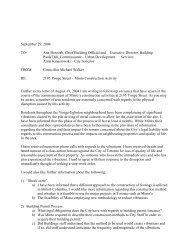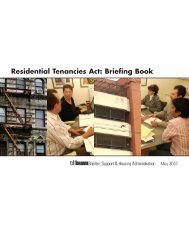Residential Tenancy Reform Consultation Paper
Residential Tenancy Reform Consultation Paper - Michael Walker
Residential Tenancy Reform Consultation Paper - Michael Walker
Create successful ePaper yourself
Turn your PDF publications into a flip-book with our unique Google optimized e-Paper software.
RESIDENTIAL TENANCY REFORM CONSULTATION PAPER<br />
Council decides that the proposal will not adversely affect<br />
the supply of affordable rental housing in the municipality.<br />
It may also be appropriate to limit the mandated municipal<br />
approval process to buildings above a certain size (such as<br />
the limitation to buildings containing five or more units<br />
under previous legislation), to allow the process to be<br />
effectively administered and to only include conversions<br />
and demolitions that could have a significant effect on the<br />
rental housing stock.<br />
A mandated municipal approval process would help<br />
municipalities with low vacancy rates protect the existing<br />
rental housing stock. This approach would also enable a<br />
comprehensive, long-term approach to the issue. However,<br />
this option could not be implemented immediately, due to<br />
the preceding policy development and legislative approvals<br />
process. There might be some short-term losses to the<br />
stock of rental housing as a result. As well, some municipalities<br />
might object to a mandated process, if the local<br />
Council did not regard the rental housing supply to be an<br />
issue in their community and considered such a process to<br />
be unnecessary red tape. However, by mandating a<br />
process, the government could ensure that local councils<br />
give proper consideration to preserving the supply of rental<br />
housing before permitting conversion or demolition.<br />
B. Bring in laws allowing each city or town to decide<br />
whether to have an approval process for demolition<br />
or conversion, based on rules set out by the<br />
provincial government.<br />
The government could introduce provincial legislation that<br />
could, if passed, make a municipal approval process optional,<br />
subject to certain provincial criteria. These criteria could<br />
include a sustained vacancy rate threshold (e.g., less than<br />
3 per cent for three years); and/or other criteria such as the<br />
percentage of tenants in core need. It may also be appropriate<br />
to limit the optional municipal approval process to<br />
buildings above a certain size, (such as the limitation to<br />
buildings containing five or more units under previous legislation),<br />
to allow the process to be effectively administered<br />
and to only include conversions and demolitions that could<br />
have a significant effect on the rental housing stock.<br />
As discussed above, proposed rules set out by the<br />
provincial government could include requiring that the<br />
property owner provide replacement rental units at similar<br />
rents, permitting demolitions if the property is structurally<br />
unsound, or allowing a conversion or demolition if the<br />
Council decides that the proposal will not adversely affect<br />
the supply of affordable rental housing in the municipality.<br />
This, again, would help municipalities with low vacancy<br />
rates protect the existing rental housing stock. Rather than<br />
requiring a municipal approvals process in all urban centres,<br />
this option would be more flexible and would permit<br />
communities greater control over how they develop.<br />
Again, there would be the possibility for short-term losses<br />
in some urban centres while longer-term rental housing<br />
protection was developed.<br />
C. Bring in laws allowing each city or town to decide<br />
whether to have an approval process for demolition<br />
or conversion, based on their own rules.<br />
The government could introduce provincial legislation<br />
allowing municipalities to set their own criteria for controlling<br />
the demolition and conversion of rental stock. Similar<br />
to option B, a municipality would have the choice whether<br />
to control demolition and conversion. However, in this<br />
option, the municipality could also determine the vacancy<br />
rate threshold or any other conditions.<br />
This option would allow municipalities to implement<br />
approval processes that meet the specific needs and conditions<br />
of their rental markets. Municipalities are aware of<br />
local housing needs and may be in the best position to<br />
make these decisions.<br />
Further, this option could enhance the authority of<br />
municipalities beyond what the courts have given them.<br />
Municipalities could establish controls over aspects such<br />
as long-term leases and other situations where currently no<br />
planning approvals are needed.<br />
28






